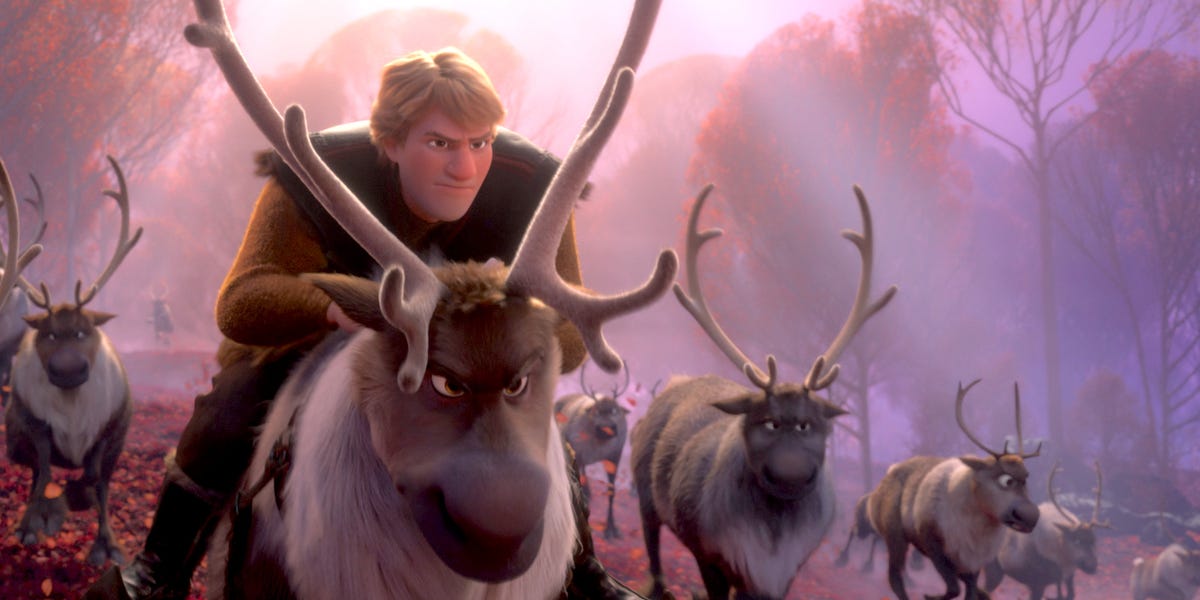Kristoff in Frozen 2 Is a Paragon of Non-Toxic Masculinity

I can tell you with certainty that Disney’s Frozen 2 is still going strong. Though it’s been out for weeks, it was still number four at the box office over the New Year’s holiday, and the packed theater of parents and kids I was in yesterday bears that out. And it’s a huge hit for good reason: because it’s great.
We’ve talked about the music, feminism, the pagan influences, and even the subtle queerness of Frozen 2, but one thing we haven’t talked about is how great this movie is at showing how a man can be sensitive and supportive of the women around him and how that makes him a hero, too. Yes, Kristoff, raised by trolls and friend of reindeer, is a perfect example of non-toxic masculinity.
To be fair, Kristoff has always been pretty great. In the first Frozen, he was a nice contrast to the manipulative villainy of Hans. He was sort of an outsider and closed off, but he opened up to love. He rightfully judged Anna’s bad decisions (don’t marry a man you’ve just met!), but he was ultimately supportive and let her do what she felt she needed to. He never tried to control Anna and he even asked for consent to kiss her! He’s a good guy to start with.
Kristoff keeps it up and really doubles down on things in Frozen 2. His entire plotline in the film is about working up the courage to propose to Anna and about finding ways to sincerely express his feelings. This is great. So much of toxic masculinity is based on the idea that men feeling anything—let alone expressing those feelings in a healthy way—is verboten.
But Kristoff knows (or at least Sven the reindeer, via Kristoff, knows) that’s it’s okay to feel your feelings. Kristoff’s big musical number in Frozen 2, “Lost in the Woods,” is the film’s only love song, and while it’s a cheesy power ballad that’s very funny, it’s also a sincere expression of insecurity about a relationship and being left behind.
He’s vulnerable. That’s the opposite of toxic masculinity. Kristoff is never put off by the fact that his girlfriend and future sister-in-law are royalty or more powerful than him, which would be typical. He just feels left behind by their closeness and Anna’s focus on Elsa. And that’s valid.
But he gets over it. When the chips are down and Anna is back, Kristoff asks the most important and amazing question of her: not “where were you?” or even “are you okay?”—he trusts her to tell him those things when the time is right. He just asks, “What do you need?”
That’s awesome. Kristoff knows his issues aren’t important right now and that there’s a strong woman there who’s leading. He never gets angry that he’s not the hero of the story. He knows that he’s strong and that he’s loved and that his feelings are valid, but it’s not all about him at this point. Toxic masculinity would dictate the opposite, but Frozen 2 is way beyond that.
By the end of the film, Anna has learned that she’s her own person, and she can be powerful and lead. This is the evolution she needed to be ready to move to the next step with Kristoff. In the height of the finale, she even tries to apologize to Kristoff for leaving him behind, and he shares with her that it’s okay: “My love is not fragile.” That’s his growth, but it’s also huge.
If Kristoff were controlled by toxic masculinity, he’d be mad and demand that Anna prioritize him. He would let his insecurity turn to anger and lash out, and that would cause conflict. But he doesn’t. He allows himself to feel—to sing it out and process things in a healthy way—and then he chooses to trust and support Anna.
I know Frozen 2 will be a defining movie for so many little girls, and that makes me happy, because I love the idea of girls hearing the message that “you are the one you’ve been waiting for” instead of “someday my prince will come.” And boys need to hear that, too, but little boys also need to see that it’s okay to be loving, to feel and be vulnerable, and to trust people and that they don’t need to force anyone to love them or give them power.
Frozen 2 is ultimately, for every character, about finding their self-confidence and independence. It’s about finding their own power and being secure in themselves as people. That’s a really important lesson for kids. It’s feminist and also the antithesis of the kind of toxic masculinity that finds validation only through the domination of emotion and others. That’s maturity. Somethings never change, but other things need to, and that’s okay.
(images: Disney)
Want more stories like this? Become a subscriber and support the site!
—The Mary Sue has a strict comment policy that forbids, but is not limited to, personal insults toward anyone, hate speech, and trolling.—
Have a tip we should know? tips@themarysue.com